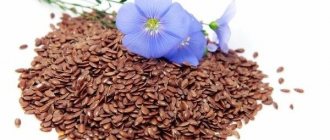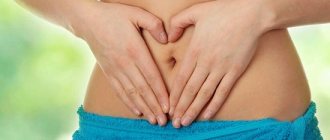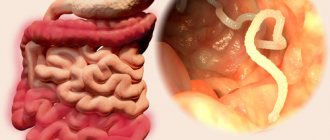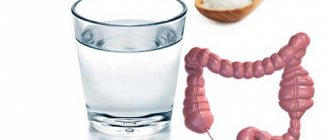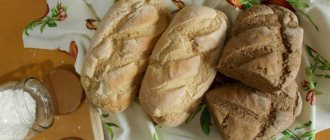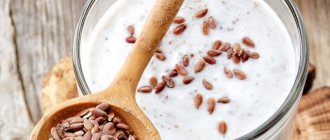Constipation is a malfunction of the intestines caused by disruption of the digestive process or other factors. The problem is manifested by the inability to empty the intestines, discomfort during bowel movements, as well as changes in the density of the stool. With this disorder, the volume of stool decreases and the consistency of stool changes.
It is recommended to eat foods that increase intestinal motility (activity), such as cereal, and also eat a balanced diet. Knowing the properties of certain products, you can independently compose and adjust your daily diet in order to restore normal intestinal function with the help of natural laxatives.
Natural laxative products
To get rid of discomfort, maintain normal bowel function, and eliminate constipation, adhere to certain nutritional principles:
- Eat often, in small portions. You need to eat 5-6 times a day, so the food will be easier to digest and assimilate.
- Eat foods rich in fiber. Dietary fiber activates receptors on the intestinal walls and enhances peristalsis. This improves the movement of feces and facilitates the process of defecation.
- Maintain drinking regime. Drink at least 2 liters of clean water per day. Water softens stool and makes it easier to pass.
Avoid foods that can cause constipation: those with preservatives, dyes, food additives, as well as processed foods and fast food. Prepare food from natural ingredients.
The effect of drugs and products with a laxative effect is to thin the stool, form bulky stools, increase intestinal activity, and moisturize the lower intestines to facilitate the process of bowel movement.
One of the main components of normal digestion is dietary fiber. Coarse plant fibers are not digested in the gastrointestinal tract. In the intestines they act as a brush, clearing it of contents. Soluble fibers adsorb liquid, form a mucous gel, soften stool, and restore normal motility and microflora.
In addition to fiber, organic acids have a pronounced laxative effect. They actively affect intestinal motility, improving its functioning.
Get rid of intestinal problems
The natural British drug is not addictive and works immediately
Find Fitomucil with benefits
The role of laxatives
Constipation occurs in the life of every person; the pharmaceutical industry offers a large selection of laxatives to facilitate the evacuation of waste products from the body. Medicines are produced in tablets, drops, solutions and effectively act on the symptoms of the pathological condition.
Before purchasing, patients try to find a suitable complex that quickly relieves constipation and is not addictive. Most medications have a one-time effect that does not eliminate the cause of the abnormalities.
To avoid the pathology becoming chronic or to reduce the number of laxatives taken, the patient must reconsider their usual diet and lifestyle. Otherwise, he will constantly need medications, and if used incorrectly, the person will not be able to go to the toilet normally without them.
Foods that make you weak
Flax seeds
Flaxseed is rich in soluble and insoluble dietary fiber. Soluble fiber helps form bulky stool, while insoluble fiber helps move it through the intestines. Seeds can be added to soups, main courses, and desserts.
Sauerkraut
Contains a large amount of fiber and probiotics. Sauerkraut is a natural source of probiotic substances that normalize intestinal microflora and help cope with chronic constipation. The product works quite quickly and has a long lasting effect. Try to eat naturally fermented cabbage, that is, without adding vinegar.
Vegetable oil
Gently affects the intestinal walls, as if lining them. This promotes softening and easy passage of stool. In addition, olive and unrefined sunflower oil increases the contractility of the small intestine, which also facilitates bowel movements.
Vegetables
Laxative foods include leafy green vegetables, including spinach, broccoli, and Brussels sprouts. Almost all vegetables are rich in fiber that is beneficial for digestion. To effectively combat constipation, you should consume them raw. Products with a laxative effect include:
- Beet. This root vegetable is high in sugar and helps loosen stool.
- Pumpkin. Contains a lot of potassium and fiber. Helps maintain normal water balance in the body.
- Carrot. Contains water-attracting sugar, as well as organic acids and dietary fiber.
Other vegetables that provide a laxative effect include zucchini. Their advantage is that they are 95% water and contain a minimal amount of fat. Zucchini normalizes the balance of microflora and stimulates the gastrointestinal tract.
Among vegetables, the above-mentioned beets have a pronounced laxative effect. The root vegetable can be eaten both raw and boiled.
The properties of beets do not change after heat treatment, so it is recommended to prepare a variety of salads from it. To normalize stool, drinking beetroot juice is very useful. It affects intestinal receptors, activating the gastrointestinal tract.
Fruits and berries
Other products of plant origin also have a pronounced laxative effect:
- Apples. The pectin contained in the peel has a beneficial effect on the intestinal walls and improves microbiological parameters.
- Kiwi. The fruits help normalize stool and promote regular bowel cleansing.
- Pears. The pulp contains a large amount of healthy sugars, and the peel contains fiber.
- Apricots (dried apricots) and strawberries. Contains acids that help soften stool.
- Avocado. The fruits contain plant fiber, organic acids and potassium.
Another proven remedy in the fight against constipation is plums. They contain both pectin and plant fibers. Plums help accumulate water in the intestines and soften stool.
Dairy products
For constipation, you should pay attention to kefir, fermented baked milk, yogurt, and natural yogurt without additives. Fermented milk products are rich in vitamins, minerals, as well as lactic acids and beneficial bacteria. Regular consumption of fresh fermented milk products is an excellent prevention of problems with bowel movements.
Seaweed
The high content of iodine and beneficial acids makes algae an indispensable remedy for cleansing the intestines. Sea kale normalizes digestion, promotes timely bowel movements, and helps form feces of optimal consistency.
How to eat when constipated
To reduce the risk of constipation and maintain normal gastrointestinal function, you need to follow a diet. A diet for constipation involves avoiding foods that interfere with bowel movements. These include:+
- fatty meat, homemade cottage cheese and sour cream;
- white rice, bananas, potatoes;
- eggs, hard cheeses;
- black tea, cocoa, alcoholic drinks;
- products made from premium flour;
- hot sauces, mustard, pepper.
It is also better not to eat foods that contain a lot of tannins, for example, persimmons, blueberries, red wine, bird cherry, and strong tea.
A diet for constipation should be aimed at enhancing intestinal motility, eliminating fermentation, and restoring the balance of microbiotic components and bile acids. What foods can you eat for constipation?
- rye bread with bran;
- oatmeal and buckwheat porridge;
- vegetarian soups;
- lean beef, veal, turkey;
- fish and seafood;
- vegetable stews and casseroles;
- butter, marmalade, marshmallow;
- apples, fresh fruit smoothies.
Watermelons, melons, apricots, mineral water, kvass, white wine, radishes, turnips, and radishes have a laxative effect.
In addition, dietary nutrition must be prepared taking into account the characteristics of the body. For example, if constipation is associated with chronic diseases of the stomach and intestines, then the diet should be selected only taking into account the recommendations of a gastroenterologist or therapist.
Sample menu for constipation
If problems with bowel movements are associated with poor nutrition and a sedentary lifestyle, then proper nutrition will help correct the condition. As a rule, in such cases, experts recommend dietary table No. 3.
The diet includes the consumption of the following products:
- salads from fresh cabbage, beets and other vegetables;
- rosehip decoction, compotes of berries and dried fruits;
- low-fat cottage cheese and sour cream;
- vegetable oils;
- vegetable soups, lean broths;
- turkey, chicken, rabbit, beef;
- fermented milk products such as fermented baked milk and yogurt.
Drink a glass of clean water 20–30 minutes before each meal. You can replace water with freshly squeezed juice, rosehip decoction, compote of berries and fruits, including prunes. If desired, you can add a teaspoon of natural honey to your drink.
Such a diet should improve the process of bowel movement. The stool should become regular and have a uniform and soft consistency.
When to use osmotic laxatives
Medicines in this group are most often used to solve problems with constipation of varying severity. A positive result is observed even with acute constipation.
Osmotic laxatives are used in the following cases:
- constipation;
- poisoning;
- preparing the patient for various operations and medical examinations.
It must be remembered that constipation that recurs and becomes chronic is a reason to consult a specialist. Gastroenterologists say that constipation is a symptom of a variety of pathologies. First of all, it is necessary to identify the causes of constipation. After eliminating the problem in the body, the symptom – constipation – will go away.
Laxative dishes
Foods that have an effective laxative effect include fruit and vegetable salads. To prepare them, you can use any approved products. Let's look at several recipes for every day as part of dietary table No. 3.
Beet and prune salad
Grate raw beets on a fine grater. Pour boiling water over the prunes and leave for 10–15 minutes. Rinse the prunes with water and chop with a knife. Mix the ingredients and add some pine or walnuts. Season the salad with olive oil. You can also add half a grated apple to the salad.
Oatmeal with kefir
Pour two tablespoons of oatmeal with kefir. Soak prunes in boiling water for 10 minutes, rinse and add to oatmeal. Grind 1 teaspoon of flaxseed in a coffee grinder and add to the porridge. Let the dish sit for 15–20 minutes. You can prepare the oatmeal the night before and let it sit in the refrigerator overnight.
Baked apples with bran
Cut the apples into 2 parts, remove the core. Mix kefir or yogurt without additives with pre-chopped bran, walnuts and dates. Pour the dressing into the cavity of the fruit. Bake in the oven for about 20 minutes at 180 degrees.
Eating foods with a laxative effect cannot always meet the body's need for dietary fiber, which is necessary for good peristalsis. For additional support, it is best to take special medications and nutritional supplements. For example, effective and safe pharmaceutical products of herbal origin include the English remedy “Fitomucil Norm”. The composition of the drug includes natural plant components - the shell of plantain seeds and the pulp of homemade plum. Soluble fiber absorbs water, turns into a gel and facilitates easy removal of stool. Insoluble fiber stimulates intestinal activity and also promotes cleansing. The product acts gently and physiologically, does not cause bloating, spasms or pain.
Top 10 rating according to KP
Constipation - which is what doctors officially call constipation - indicates problems in the gastrointestinal tract.
If the process becomes chronic, then this is a serious cause for concern. Obviously: it's time to see a doctor. Because it turns out that the problem cannot be solved with auxiliary drugs alone. “Treatment of chronic constipation should be comprehensive,” says gastroenterologist Lilia Sagdutdinova . – It is necessary to change your lifestyle - increase physical activity, reconsider your diet, accustom yourself to an optimal water regime, and, of course, select medications together with your doctor.
But how to deal with the wealth that dazzles pharmacy windows? According to Dr. Sagdutdinova, a number of medications are prescribed as first-line drugs (that is, with which any treatment begins) to soften the intestinal contents and increase its volume. Let's take a closer look at some of them.
Psyllium (Mucofalk, Phytomucil)
Mucofalk. Photo: Losan Pharma
The active component here is the shell of plantain seeds. Therefore, the drug is suitable for lovers of everything natural. Depending on the form, packaging, and manufacturer, you can choose the same drug to suit any wallet size.
Indications:
- acute and chronic constipation;
- anal fissures, hemorrhoids;
- postoperative period for interventions in the anorectal area (to relieve additional suffering during defecation).
It seems like a cool thing. But, alas, it is not suitable for everyone. Carefully study the features before using the medicine.
Contraindications:
- organic narrowing of the gastrointestinal tract (stenosis);
- intestinal obstruction;
- abdominal pain of unknown origin (there is a risk of not only being cured, but also causing harm);
- children under 18 years of age (this applies to Psyllium, but Mucofalk and Fitomucil are available for children from 12 years of age);
- hypersensitivity to the drug.
To the point
How to treat hemorrhoids in men: pills, diet or surgery
Peculiarities
“During the treatment period, you should drink at least 1.5 liters of liquid per day,” warns Liliya Sagdutdinova. — The effect of the drug can occur within 24-48 hours, that is, you should not count on an immediate effect.
show more
Macrogol 4000 (Forlax)
Forlax. Photo: Beaufour Ipsen Industry
This is already a synthetic drug, the active substance is called macrogol, and the number 4000 does not mean its market price, but only its molecular weight. But these are already details.
So, this drug is prescribed for the symptomatic treatment of constipation in adults and children over the age of 8 years. Many doctors are convinced that this substance is practically free of side effects, and can be very useful for solving stool problems. True, there are a number of contraindications. And this should be taken seriously.
Contraindications:
- inflammatory bowel diseases (ulcerative colitis, Crohn's disease);
- toxic megacolon in combination with symptomatic stenosis;
- perforation or threat of perforation of the gastrointestinal tract (perforation is a through defect in the wall of a hollow organ - author's note);
- intestinal obstruction or suspected intestinal obstruction;
- abdominal pain of unknown etiology;
- children under 8 years of age;
- hypersensitivity to macrogol (polyethylene glycol) or other components of the drug.
Peculiarities
The laxative effect of Forlax, as in the case of the previous line of drugs, occurs 24-48 hours after administration. It is unlikely to be suitable as an emergency measure.
show more
Lactitol (Exportal)
Exportal. Photo: PharmVILAR
Lactitol is a hydrocarbon alcohol obtained from milk sugar (the well-known lactose). It has a detrimental effect on proteolytic (in other words, putrefactive) bacteria, and promotes the growth of acidophilic bacteria (and these are already very useful microorganisms).
And, by the way, the drug helps not only during constipation.
Indications:
- constipation;
- the need to regulate bowel movements for medical purposes (for example, bowel cleansing in preparation for endoscopic and x-ray examinations, surgical interventions on the rectum, anal sphincter and the area adjacent to it);
- intestinal dysbiosis;
- hepatic encephalopathy, hepatic coma and precoma, hyperammonemia (increased ammonia levels in the blood).
Contraindications:
- galactosemia (another metabolic disorder);
- intestinal obstruction;
- suspicion of organic gastrointestinal lesions;
- abdominal (in the abdomen) pain and rectal bleeding of unknown origin;
- individual intolerance to lactitol.
Reception feature
“The laxative effect usually occurs within 24 hours after using the drug,” notes Liliya Sagdutdinova. — At the beginning of the course of treatment, the laxative effect of the drug may be delayed; the effect may occur on the second or third day of its use. And another important point. When you first take the medicine, you may experience abdominal discomfort and flatulence. These phenomena, as a rule, disappear with continued use of the drug as you adapt to it.
show more
Lactulose (Duphalac, Portolac, Normaze)
Duphalac.
Photo: Abbott Biologicals BV It acts through changes in the flora of the colon: the number of lactobacilli increases, accordingly, acidity increases, and as a result, the process of emptying the intestines from contents is accelerated.
Indications:
- constipation, incl. chronic, during pregnancy, hemorrhoids;
- after surgery on the colon and/or anus, to prepare for surgery on the colon;
- to soften stool (facilitate defecation) in case of pain after removal of hemorrhoids;
- hepatic encephalopathy; hepatic precoma and coma.
Contraindications:
- rectal bleeding;
- colo-, ileostomy;
- suspicion of appendicitis;
- galactosemia; lactose intolerance, lactase deficiency, glucose-galactose malabsorption;
- intestinal obstruction;
- hypersensitivity to lactulose.
Peculiarities
As in the previous paragraph: in the first days of taking it, flatulence may appear, but usually this effect gradually decreases and passes.
show more
Bisacodyl (Guttalax), sennosides A and B (Senade)
Guttalax. Photo: Istituto De Angeli
“For patients with constipation, in order to normalize stool for a short period of time (2 weeks!), it is recommended to prescribe stimulant laxatives,” says Dr. Sagdutdinova. – Such drugs enhance perilstatics by stimulating the nerve endings of the intestinal mucosa.
These include: bisacodyl, sodium picosulfate, anthraquinones, sennosides A and B.
Contraindications:
- intestinal obstruction;
- acute inflammatory diseases of the abdominal organs;
- abdominal pain of unknown origin;
- peritonitis;
- children under 4 years of age;
- lactose intolerance, lactase deficiency, glucose-galactose malabsorption.
Good to know
How to reduce the risk of developing hemorrhoids during pregnancy?
In addition to contraindications, one must take into account the fact that the use of stimulant laxatives to cleanse the intestines often causes side effects. For example, instead of constipation, you can provoke diarrhea, with pain and flatulence in addition. Moreover, frequent use of such drugs leads to potassium deficiency in the body and is addictive. Doctors do not recommend using such medications for longer than two weeks!
show more
Microlax
Microlax. Photo: Famar Orleans
One of the fastest-acting laxatives, Microlax, is a microclyster for rectal administration with sodium citrate, sodium lauryl sulfoacetate and an aqueous solution of sorbitol. Helps with difficult bowel movements, acting directly at the site of constipation.
Approved for use during pregnancy, lactation and newborns. The drug is very easy to use independently at home; each microenema contains the required dose of the substance. It is not recommended to use on an ongoing basis.
show more
Kolofort
Kolofort.
Photo: Materia Medica The drug in the form of lozenges helps overcome stool disorders by normalizing gastrointestinal motility. Unlike other laxatives, Kolofort has a comprehensive effect on the problem and works for irritable bowel syndrome.
It is not recommended to take the drug during pregnancy, lactation, children under 18 years of age and those with lactase deficiency or lactose intolerance. For best results, a course of treatment is indicated.
show more
Fitolax
Phytolax. Photo: Evalar
Senna leaf extract in Fitolax triggers intestinal peristalsis, and plantain has analgesic properties.
Among other things, the preparation contains prunes, apricot extract and dill. Thanks to its natural composition, it has virtually no contraindications.
This dietary supplement is available in pharmacies in several forms: tablets, filter bags, bars, gummy lozenges and sachets. Approved for use by persons over 14 years of age.
show more
Glycerin suppositories
Glycerin suppositories. Photo: Antibiotice
Glycerin suppositories are a safe way to relieve constipation. Glycerin in rectal suppositories helps soften stool and acts exclusively locally.
It has no side effects and is often used during pregnancy and lactation. For hemorrhoids and fissures in the anus, it is better not to use the drug.
show more
10. Gas-forming suppositories (Calciolax, Ferrolax)
To activate natural bowel movements, you can use gas-forming suppositories. The principle of their action is to provoke the urge to defecate, the absence of which provoked constipation.
The manufacturer indicates in the instructions that there are no contraindications. The effect of the drug occurs within half an hour. You should not use the drug for more than five days in a row or if there is inflammation. The drug is not contraindicated for children, pregnant and lactating women.
Components that make stool easier
Products with a laxative effect work due to the content of certain components in them. By adding them to your diet, you can establish regular bowel movements. Below we will consider which food components stimulate intestinal function.
Cellulose
Fiber is almost not digested, but it loosens feces, increasing the volume of intestinal contents, and mechanically stimulates peristalsis. Insoluble fiber is a probiotic. They promote the nutrition and proliferation of beneficial bacteria. Therefore, laxatives include all foods with a large amount of coarse fiber: vegetables and fruits, mainly raw, boiled and baked. Record holders for fiber content among vegetables are cabbage, radishes, greens, cucumbers, beets, pumpkin, zucchini, onions, and apples, plums, and bananas are especially useful among fruits.
Fiber is also found in pearl barley, buckwheat and oatmeal, bulgur, and dried fruits. There are also some types of meat dishes that are more difficult to digest and can stimulate the intestines, such as meat with skin and connective tissue fibers.
Sugary substances
Laxative products include those rich in sugary substances: sugar, honey, jam, ice cream, whole milk, sweetened fruit juices, etc. Sugary substances contain carbohydrates, which attract a lot of fluid into the intestines. Also, substances undergo fermentation processes, which increases the attraction of water into the intestinal lumen. Products containing sugary substances should be consumed in limited quantities.
Organic acids
Such acids are found in fermented milk products, in particular in kefir, yogurt, koumiss, as well as in fruit drinks and sour juices - rhubarb, tomato. They increase the secretion of fluid into the intestinal lumen, moisturize feces, and stimulate motility.
It is important to remember that consuming foods with organic acids is not recommended for gastritis, accompanied by high acidity, as well as for peptic ulcers of the stomach and duodenum.
Salt
Salty foods attract water to the intestines, helping to thin the stool. Such products include hydrocarbonate-sulfate mineral water, herring, fish caviar, corned beef, cheeses in brine, lard, etc. It is necessary to limit the use of such products in case of edema, kidney diseases and cardiovascular diseases.
Fat
Fat promotes easy movement of stool and simplifies the process of bowel movement. Butter, sour cream with a fat content of more than 30%, various types of vegetable oils (olive, rapeseed, sesame, flaxseed, sunflower, etc.), fish oil, lard, mayonnaise, cream, cheese and other fatty sauces - all these are products that have a laxative effect . But it’s important to remember that you shouldn’t get carried away with them either. Preference should be given to vegetable fats, and do not forget to include fatty fish in your diet.
Cold dishes
Stimulation of temperature receptors in the oral cavity leads to a reflex contraction of the muscles of the digestive system, and therefore to increased peristalsis. Ice cream, cold soups (okroshka, beetroot soup), as well as cold drinks help fight constipation.
You can consume the latter immediately after waking up to trigger the necessary bowel movement reaction. A good option is mineral water, which gives several positive effects at once.
Carbonic acid (carbon dioxide)
There are drinks rich in carbon dioxide, which breaks down into water and carbon dioxide, which stimulates intestinal motility by activating receptors by bubbles and increasing the volume of intestinal contents. Plain carbonated and sparkling mineral water are effective in combating constipation.
List of drugs
Pharmacological enterprises produce three types of osmotic drugs that have a laxative effect on the body. Pharmacies offer a large number of such drugs.
Table “Osmotic laxatives”:
| group | Name | properties | contraindications | by-effect |
| salt preparations |
|
|
|
|
| prebiotics |
|
| allergic reaction; | flatulence; |
| Macrogol and its analogues |
|
| hypersensitivity to the substances included in the composition; |
|
It is recommended to consult a doctor before starting to take medications.




